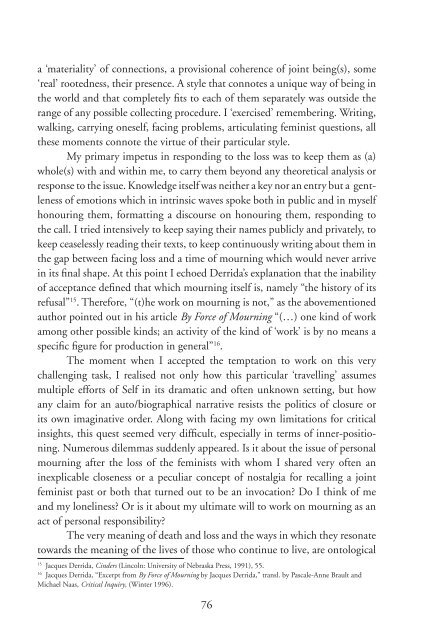Teaching Subjectivity. Travelling Selves for Feminist ... - MailChimp
Teaching Subjectivity. Travelling Selves for Feminist ... - MailChimp
Teaching Subjectivity. Travelling Selves for Feminist ... - MailChimp
You also want an ePaper? Increase the reach of your titles
YUMPU automatically turns print PDFs into web optimized ePapers that Google loves.
a ‘materiality’ of connections, a provisional coherence of joint being(s), some<br />
‘real’ rootedness, their presence. A style that connotes a unique way of being in<br />
the world and that completely fits to each of them separately was outside the<br />
range of any possible collecting procedure. I ‘exercised’ remembering. Writing,<br />
walking, carrying oneself, facing problems, articulating feminist questions, all<br />
these moments connote the virtue of their particular style.<br />
My primary impetus in responding to the loss was to keep them as (a)<br />
whole(s) with and within me, to carry them beyond any theoretical analysis or<br />
response to the issue. Knowledge itself was neither a key nor an entry but a gentleness<br />
of emotions which in intrinsic waves spoke both in public and in myself<br />
honouring them, <strong>for</strong>matting a discourse on honouring them, responding to<br />
the call. I tried intensively to keep saying their names publicly and privately, to<br />
keep ceaselessly reading their texts, to keep continuously writing about them in<br />
the gap between facing loss and a time of mourning which would never arrive<br />
in its final shape. At this point I echoed Derrida’s explanation that the inability<br />
of acceptance defined that which mourning itself is, namely “the history of its<br />
refusal” 15 . There<strong>for</strong>e, “(t)he work on mourning is not,” as the abovementioned<br />
author pointed out in his article By Force of Mourning “(…) one kind of work<br />
among other possible kinds; an activity of the kind of ‘work’ is by no means a<br />
specific figure <strong>for</strong> production in general” 16 .<br />
The moment when I accepted the temptation to work on this very<br />
challenging task, I realised not only how this particular ‘travelling’ assumes<br />
multiple ef<strong>for</strong>ts of Self in its dramatic and often unknown setting, but how<br />
any claim <strong>for</strong> an auto/biographical narrative resists the politics of closure or<br />
its own imaginative order. Along with facing my own limitations <strong>for</strong> critical<br />
insights, this quest seemed very difficult, especially in terms of inner-positioning.<br />
Numerous dilemmas suddenly appeared. Is it about the issue of personal<br />
mourning after the loss of the feminists with whom I shared very often an<br />
inexplicable closeness or a peculiar concept of nostalgia <strong>for</strong> recalling a joint<br />
feminist past or both that turned out to be an invocation? Do I think of me<br />
and my loneliness? Or is it about my ultimate will to work on mourning as an<br />
act of personal responsibility?<br />
The very meaning of death and loss and the ways in which they resonate<br />
towards the meaning of the lives of those who continue to live, are ontological<br />
15<br />
Jacques Derrida, Cinders (Lincoln: University of Nebraska Press, 1991), 55.<br />
16<br />
Jacques Derrida, “Excerpt from By Force of Mourning by Jacques Derrida,” transl. by Pascale-Anne Brault and<br />
Michael Naas, Critical Inquiry, (Winter 1996).<br />
76

















